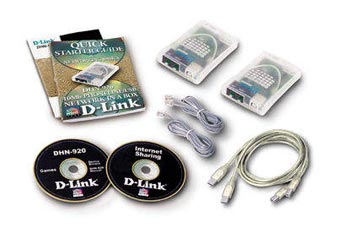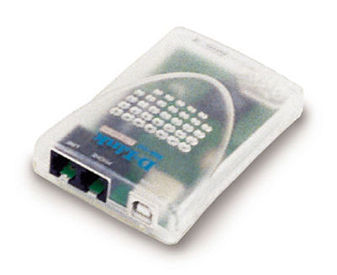Digging into Phoneline Networking and HomePNA 2.0
by Eric Hagen on December 20, 2001 12:00 PM EST- Posted in
- IT Computing
D-Link DHN-920
D-Link was one of the first manufacturers to release hardware using the HPNA 2.0 standard at the beginning of 2000. It is also one of the largest producers of home networking equipment. We took a look at their PCI home networking kit, the DHN-910, last year. This kit includes two of D-Link’s DHN-520 PCI adapters using the Broadcom chipset. As we showed then, virtually all products using this Broadcom chipset show identical performance.

This time around, D-Link chose to send their DHN-920, which is the USB variant of the DHN-910. It includes two USB HPNA 2.0 network adapters (DHN-120) and the required USB and phoneline cables for setting up two computers. It also includes an Internet Sharing package from MidPoint.
Software
This MidPoint Lite sharing software is a stripped down version of MidPoint’s flagship software bundle. Essentially, it is a proxy server that allows the sharing of web, email and some other applications. Because it is not a NAT based implementation, it requires a great deal of manual configuration to get functionality through most software and many utilities which use dynamically assigned ports simply will not function. Software like Sygate or Microsoft’s Internet Connection Sharing is probably best for most users.
The manuals shipped with this package are thorough and the drivers are simple to install and transparent to the user once running. The “extras” included in the package amount to little more than a few aging games, including Diablo.
Specifications

Power for each DHN-120 is provided directly by the USB bus, negating the need for an external power adapter. It can be plugged into any USB host or hub port that provides 500mA of current as defined in the USB specifications 1.0 and 1.1 as a high-powered USB device.
The devices themselves are relatively small and lightweight. They are also very lightweight, which is a benefit for mobility but makes them somewhat awkward with very stiff USB cables. The cables tend to cause them to flip or stand on edge; overall, this is not a huge problem. Two LEDs are mounted on the top of each DHN-120 to provide the user with power state and current link and traffic status for the LAN connection.
The cards also have dual RJ-11 phone jacks to allow a pass-through to a second computer or a telephone without the use of a splitter. This is definitely a positive feature for a device that is portable and hot swappable like the DHN-120.
These are somewhat larger than the 2wire USB devices we took a look at, but they are small enough to tuck in a shirt pocket or slip in the side pocket of a briefcase, so that shouldn’t be an issue. The removable USB cable does make them somewhat more portable than the 2wire setup.
Cost
As is common for USB HPNA devices, the DHN-920 is priced somewhat higher than it’s PCI counterparts. D-Link sells them directly for $94.99, and a quick search around the ‘net can find them for $92. This contrasts with the lower price of $69.99 for the DHN-910 with two PCI cards. The DHN-920 includes two USB adapters, cables (USB and phone line) and the Midpoint Lite software.
These "Network in a box" kits are noticably less expensive than the individual units. Single DHN-120 adapters are difficult to find for under $75, bring the cost for two in excess of $150; 50% higher than the cost of a kit. Also, two adapters and two standard phone cables are all that is required to set up a fully functional HomePNA 2.0 network.










0 Comments
View All Comments